

Ecology effects : new economy. United Nations Environment Programme. The United Nations Environment Programme (UNEP) is an agency of the United Nations that coordinates its environmental activities, assisting developing countries in implementing environmentally sound policies and practices.
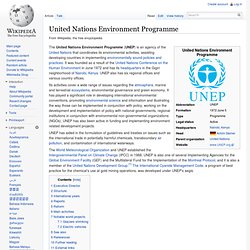
It was founded as a result of the United Nations Conference on the Human Environment in June 1972 and has its headquarters in the Gigiri neighborhood of Nairobi, Kenya. UNEP also has six regional offices and various country offices. Its activities cover a wide range of issues regarding the atmosphere, marine and terrestrial ecosystems, environmental governance and green economy. It has played a significant role in developing international environmental conventions, promoting environmental science and information and illustrating the way those can be implemented in conjunction with policy, working on the development and implementation of policy with national governments, regional institutions in conjunction with environmental non-governmental organizations (NGOs).
Green economy. The green economy is one that results in reducing environmental risks and ecological scarcities.
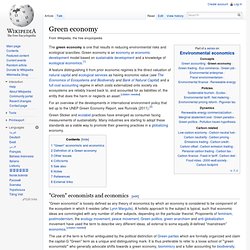
Green economy is an economy or economic development model based on sustainable development and a knowledge of ecological economics.[1] A feature distinguishing it from prior economic regimes is the direct valuation of natural capital and ecological services as having economic value (see The Economics of Ecosystems and Biodiversity and Bank of Natural Capital) and a full cost accounting regime in which costs externalized onto society via ecosystems are reliably traced back to, and accounted for as liabilities of, the entity that does the harm or neglects an asset. [citation needed] For an overview of the developments in international environment policy that led up to the UNEP Green Economy Report, see Runnals (2011).[2] Green Sticker and ecolabel practices have emerged as consumer facing measurements of sustainability.
Environmental economics. Environmental economics is a sub-field of economics concerned with environmental issues.
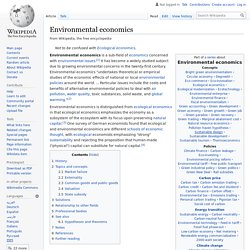
It has become a widely studied topic due to growing environmental concerns in the twenty-first century. Environmental Economics "...undertakes theoretical or empirical studies of the economic effects of national or local environmental policies around the world ... . Particular issues include the costs and benefits of alternative environmental policies to deal with air pollution, water quality, toxic substances, solid waste, and global warming. "[1] Topics and concepts[edit] Market failure[edit] Air pollution is an example of market failure, as the factory is imposing a negative external cost on the community.
Externality[edit] An externality exists when a person makes a choice that affects other people in a way that is not accounted for in the market price. Common goods and public goods[edit] These challenges have long been recognized. Global biochemical cycles. Sustainable development. While the modern concept of sustainable development is derived mostly from the 1987 Brundtland Report, it is also rooted in earlier ideas about sustainable forest management and twentieth century environmental concerns.
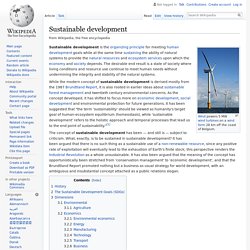
As the concept developed, it has shifted to focus more on economic development, social development and environmental protection for future generations. It has been suggested that "the term 'sustainability' should be viewed as humanity's target goal of human-ecosystem equilibrium (homeostasis), while 'sustainable development' refers to the holistic approach and temporal processes that lead us to the end point of sustainability.
"[1] The concept of sustainable development has been — and still is — subject to criticism. Smart growth. Smart growth is an urban planning and transportation theory that concentrates growth in compact walkable urban centers to avoid sprawl.
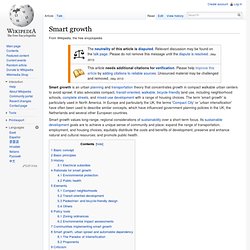
It also advocates compact, transit-oriented, walkable, bicycle-friendly land use, including neighborhood schools, complete streets, and mixed-use development with a range of housing choices. The term 'smart growth' is particularly used in North America. In Europe and particularly the UK, the terms 'Compact City' or 'urban intensification' have often been used to describe similar concepts, which have influenced government planning policies in the UK, the Netherlands and several other European countries.
Smart growth values long-range, regional considerations of sustainability over a short-term focus. Basic concept[edit] The concept of "smart growth" emerged in 1992 from the United Nation's adoption of Agenda 21 at the UN Conference on Environment and Development (UNCED) held in Rio de Janeiro, Brazil. Basic principles[edit] Conservation devt. Green economy.